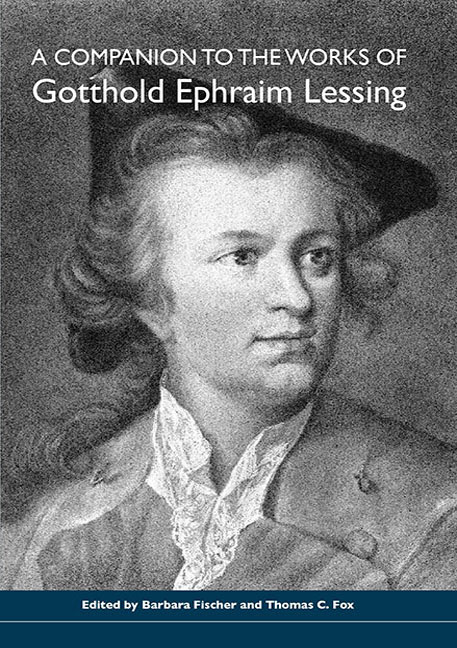Book contents
- Frontmatter
- Contents
- List of Illustrations
- Acknowledgments
- Lessing Editions and Abbreviations
- Selected Works by Lessing
- Introduction
- Lessing's Life, Work, and Times
- Criticism and Aesthetics
- Philosophy and Theology
- Lessing and Philosophy
- Lessing and Theology
- Lessing and the Jews
- Drama and Drama Theory
- Reception
- Contact Organizations
- Works Cited
- Notes on the Contributors
- Index
Lessing and the Jews
from Philosophy and Theology
Published online by Cambridge University Press: 28 April 2017
- Frontmatter
- Contents
- List of Illustrations
- Acknowledgments
- Lessing Editions and Abbreviations
- Selected Works by Lessing
- Introduction
- Lessing's Life, Work, and Times
- Criticism and Aesthetics
- Philosophy and Theology
- Lessing and Philosophy
- Lessing and Theology
- Lessing and the Jews
- Drama and Drama Theory
- Reception
- Contact Organizations
- Works Cited
- Notes on the Contributors
- Index
Summary
Celebrated for the enlightened humanism of Nathan der Weise (Nathan the Wise, 1779) and its positive portrayal of the play's Jewish protagonist — a portrayal many understood to be Lessing's tribute to Moses Mendelssohn — Lessing's entire work and thought have also encountered strong reservations and criticism. His sympathies for the Jews cost him the respect of those preoccupied with the myth-building of German nationalism in the nineteenth century. In fact, Lessing was taken to task by some for his “un-German,” even for his “Jewish” character. This controversial status during the establishment of a national canon of German literature has defined the interest and concern for the subject “Lessing and the Jews.” As a consequence, the way in which the subject would be addressed was shaped by the interests of the cultural war about national identity that was to characterize much of nineteenth-century Germany's cultural politics. The emergence of Germanistik in a climate determined by the agenda of this ongoing culture war had a profound impact in framing the subject of Lessing and the Jews as a question of national and ideological rather than religious or philosophical concern. Indeed, this went so far as to define both the sympathies and antipathies for Lessing in a lasting manner. While Lessing thus served as a key figure in the struggle of staking out the claims and counter-claims of both German nationalists and German Jews, the situation has changed little after Auschwitz except for the participants. With the Jews gone, Lessing has become a curiously absent presence in Germany, just as the Jews once had been. Against those critics who consider Lessing as a liability of an obsolete canon, others maintain the signal importance of Lessing as a rare champion of tolerance and freedom of thought.
Yet for Lessing the problem presented itself differently. For him, the importance of Jews presented less a challenge to an emerging national sentiment than to the question what role Christian identity was to play in this national project. For Lessing this was less ethnically determined than imagined as a new political space yet to be constituted, and therefore open to all regardless of their religious affiliation. To Lessing the challenge of the Jews posed itself in terms of Christianity. For if Christianity were to play any role in the age of Enlightenment, its assumptions and presuppositions had to be examined.
- Type
- Chapter
- Information
- A Companion to the Works of Gotthold Ephraim Lessing , pp. 185 - 208Publisher: Boydell & BrewerPrint publication year: 2005



